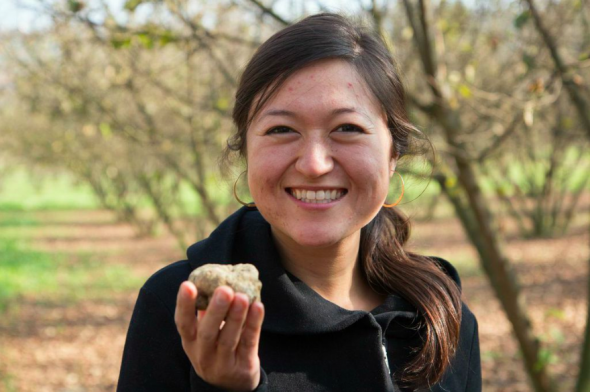Whether you work from home or in an office, it's easy to get caught in your 'cocoon'. We're thankful for intermittent events and field trips that introduce to new people and places. When we attended last year's Food + Enterprise event in Brooklyn, Vera was one of the other business mentors in attendance. It's a good reminder to balance dedication and consistency with adventure and out-of-the-norm experiences. You never know who you might meet, and how they might change the way that you think.
For those of you seeking immediate inspiration, the next Food + Enterprise gathering is happening this weekend, from February 27th - March 1st, 2015. Drool over the agenda at http://foodandenterprise.com.
When did you know that you wanted to work in food?
In 2007, I traveled to Namibia. A bright-eyed college student, I was drawn to the Kunene Region because of the endangered black rhinoceros. Thinking I would become a wildlife biologist, I was part of a team researching the effects of livestock herding on wildlife habitat. (We hypothesized that agriculture was having a negative effect on the endangered rhino; turns out, it was not.) Throughout my four months in the bush, I witnessed families sustaining themselves on just goat's meat and milk they produced, and others on vegetables they grew in soil that received an average of only 9.5 inches of rainfall a year. I knew then that I needed to educate myself more about food - where it comes from, and how its grown. I hadn't guessed it would be the farmers, not charismatic megafauna I met, that would inspire my career trajectory.
How did you get your current good food job?
I was finishing my three-year fellowship with Bon Appétit Management Company Foundation and was interested in merging my passion for agriculture with my skills in communications. I wrote to Shelburne Farms, an educational nonprofit integrated with a 1,400-acre farm, expressing my interest in their work. I had been attracted to Shelburne Farms for its blend of leading-edge farm-based education and farm-to-school programs, sustainable agriculture, and social enterprises, including a farm-to-table restaurant and award-winning farmstead cheese. Shortly after I sent the letter, I attended the 2012 National Farm to Cafeteria Conference in Vermont. Upon stepping off the bus for a conference field trip at Shelburne Farms, I shook hands and introduced myself to its vice president, Megan Camp. This conversation was the beginning of the position created for me.
How did your previous work or life experience prepare you for a good food job?
Before joining Shelburne Farms, I laid a foundation in agriculture through studying at the Chewonki Semester School (formerly known as the Maine Coast Semester) in high school, founding Carleton College's Food Truth student organization, practicing permaculture design at the Instituto de Permacultura e Ecovilas do Cerrado in Brazil, completing an Apprenticeship in Ecological Horticulture at University of California Santa Cruz, serving as a garden educator in San Francisco, and conducting research on small- and mid-sized farms on the West Coast for Bon Appétit. I had great food systems and communications mentors along the way, and I wrote and did photography every chance I got.
What was the greatest obstacle you had to overcome in pursuing your Good Food Job dream?
The current expansion of the food and agriculture sector means we must constantly adjust our roles and contributions, but I think this is also an opportunity. There are so many aspects to food, and so many ways to explore and understand it - reading, writing, growing, cooking, and tasting to name a few. I think it takes a lifetime to explore food's cultural, social, political, and environmental layers.
What can you identify as the greatest opportunities in food right now?
Take advantage of the cross disciplinary aspect of the field. As employees and/or business owners in food, we are expected to be well-informed. Farmers are professors, chefs are writers. This encourages us to understand the food system from broader perspectives and makes us better at our work.
If you could be compensated for your work with something other than money, what would it be?
At Shelburne Farms, part of my wellness benefit as a full-time employee is membership in their Community Supported Agriculture (CSA) program. In season, I receive a fresh basket each week that includes some variety of: farmstead cheese, pastured eggs, organic kohlrabi, fennel, garlic scapes, poblano peppers, basil, sweet onions, shiitake mushrooms, seaberries, elderberries, and/or more. The CSA connects me with agriculture, seasons, and place on a deeper level. Sometimes employees cash out their wellness benefit, but I've never considered it.
Aside from food, I love having "aha!" moments, or coming to feelings of new realization and inspiration. I also enjoy facilitating "aha" moments for others, whether during a conversation with a journalist on the farm or at an event I've helped organize. Recently after a Slow Food Vermont meeting I was speaking with a board member about what makes farmstead, raw milk cheeses (like Shelburne Farms') special and why so few cheesemakers maintain this tradition today. It was exciting to witness the surprise, interest, and connections that were made as we spoke. Unpasteurized milk is subject to even slight changes in weather and biology of pasture, so cheesemakers are working with milk that is different (i.e., in terms of protein, fat, solids) season by season, day by day. They then have to change their targets for cheese, such as salt to moisture ratio, every day. It is amazing how two different cheddars, both with the same name, can be so different from one another.









